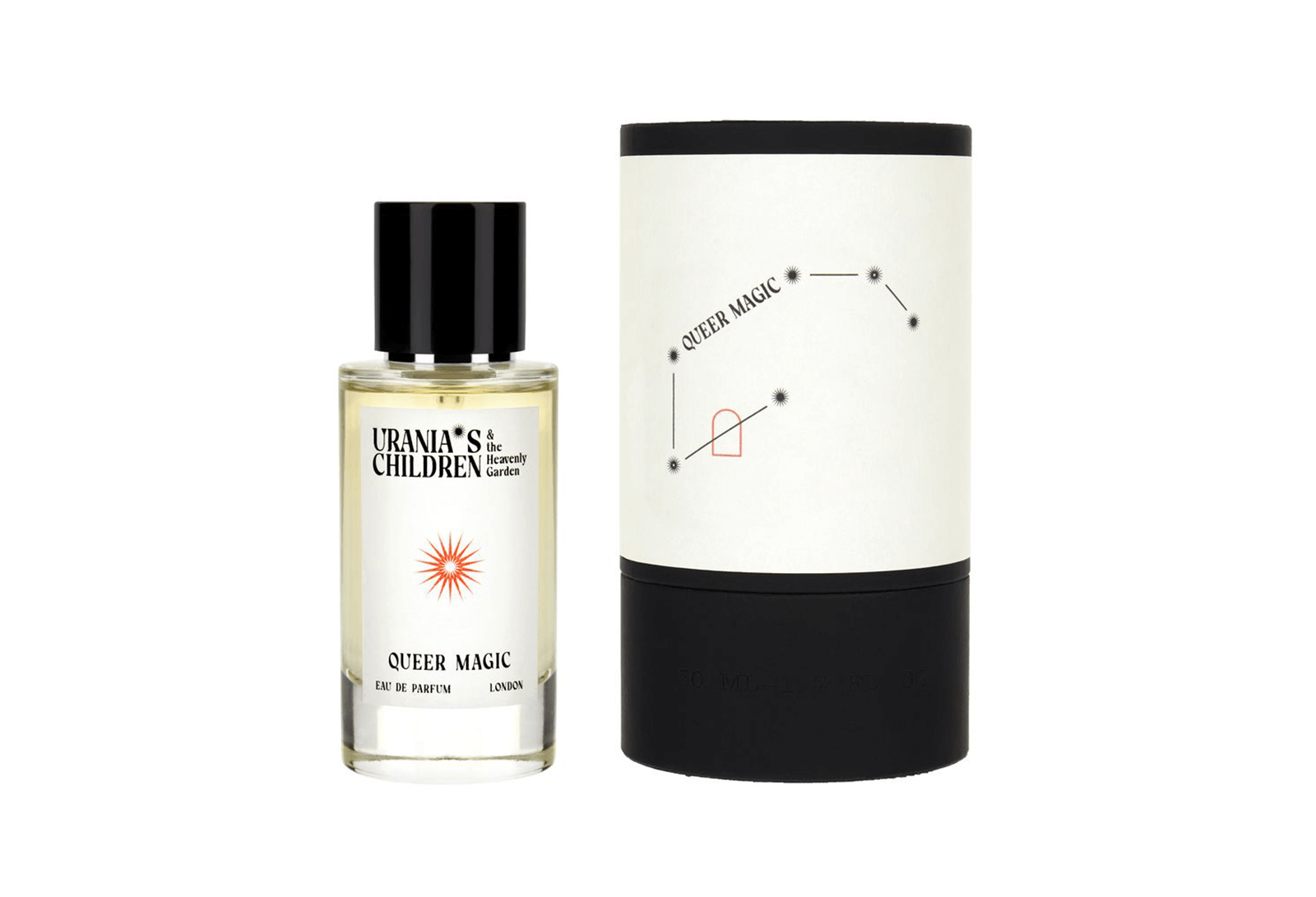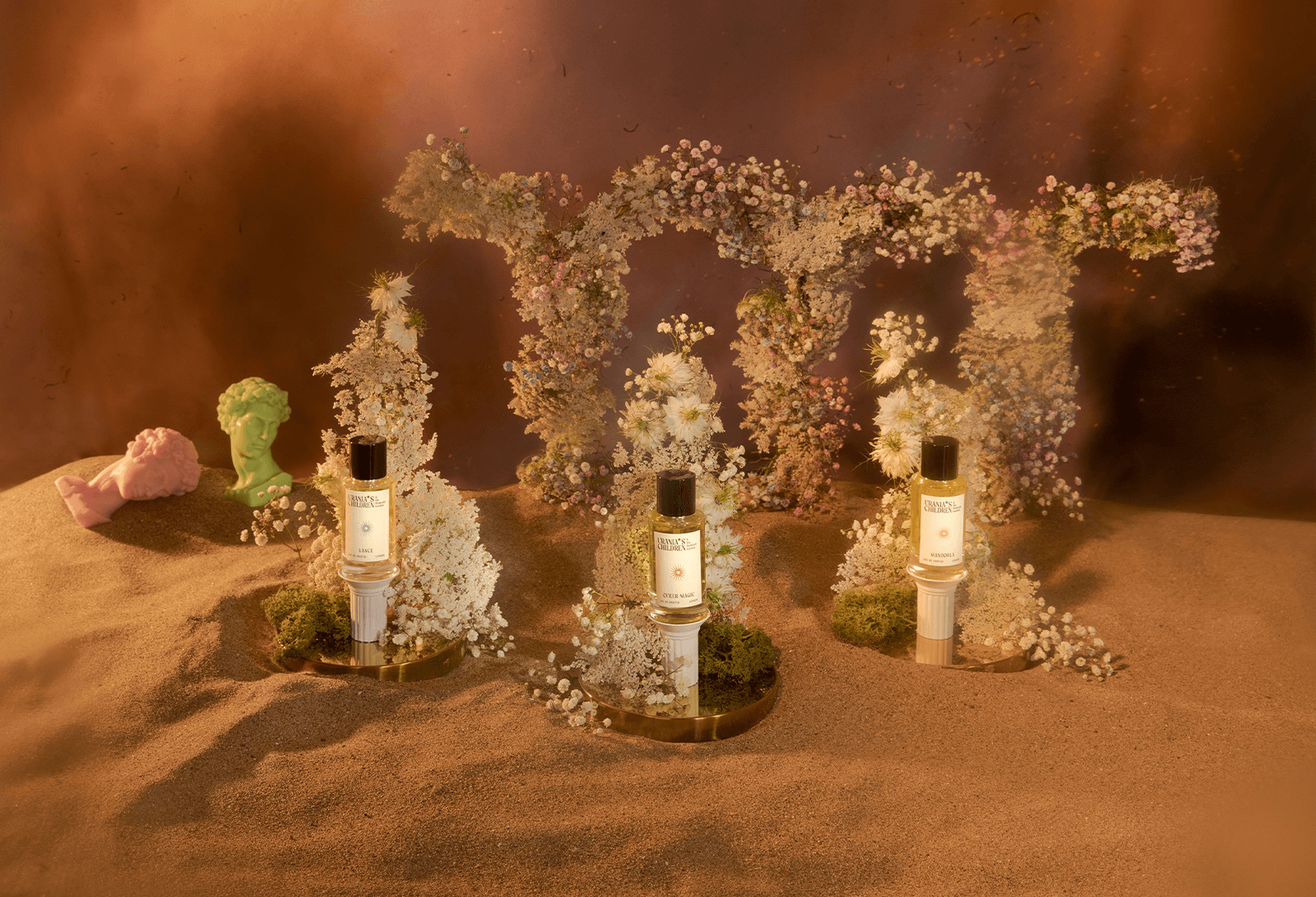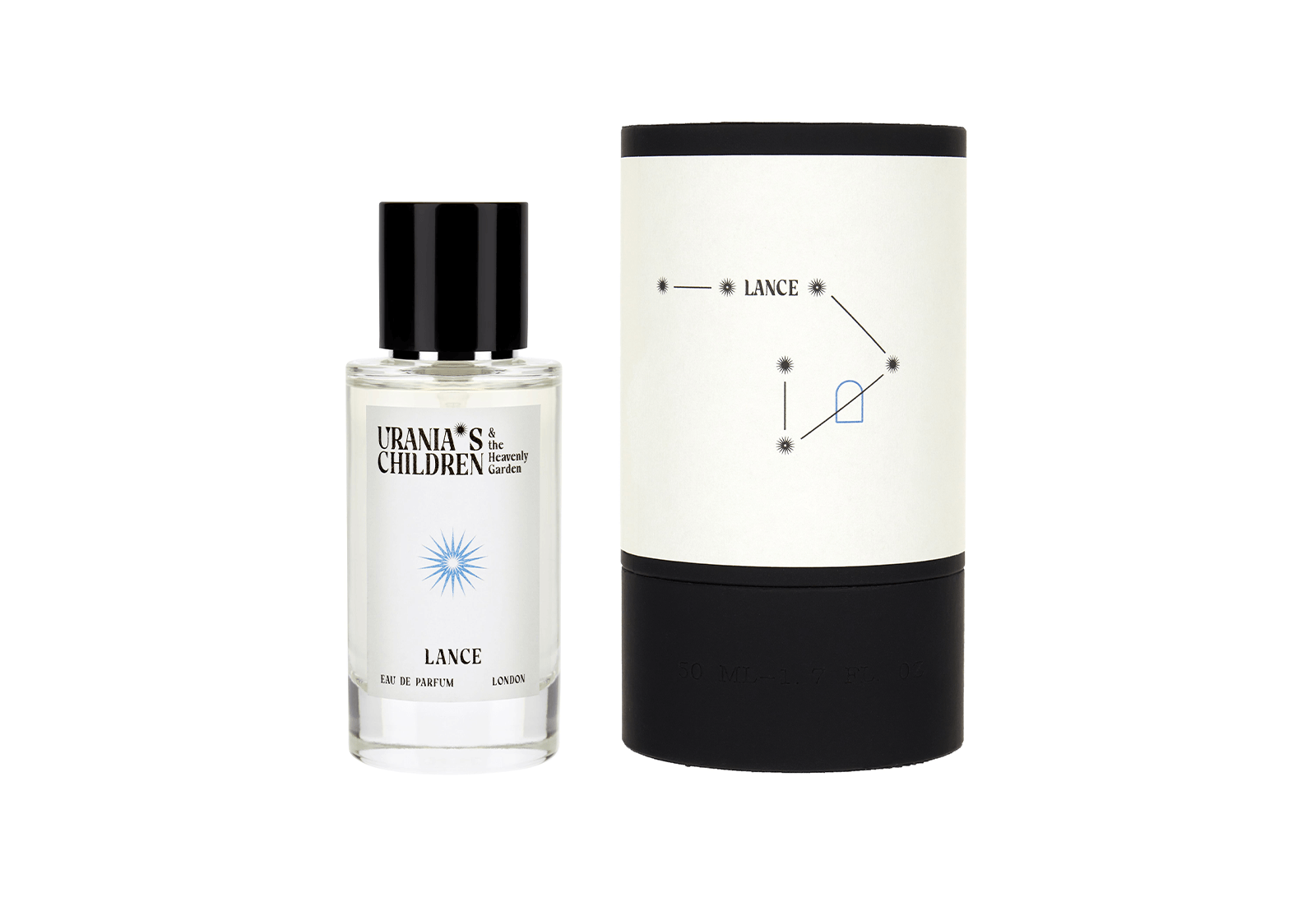The $50.85 billion global fragrance industry has operated under gendered marketing terminology for decades: cologne pour homme, eau de parfum for her. In the last decade, unisex perfumery has seen huge growth, driven by the niche sector that prioritizes olfactory storytelling over gender categories. In the US, the unisex fragrance market is estimated to reach $190 million in 2025. There is a growing imperative for products that look beyond the binary of male/female products.
Urania’s Children & The Heavenly Garden is where scented stories and gender fluidity collide: a richly poetic universe where fragrance artistry and sensuality reign supreme. Urania was the celestial and spiritual epithet of Aphrodite and also the muse of astronomy, hence the unique and coordinating constellations covering the packaging of each product. The Heavenly Garden refers to a mythical garden where the children of the goddess can roam free―a nod to the temple in Athens belonging to Aphrodite Urania where the then-outcasts of society congregated and were cared for. Each fragrance helps bring this utopian vision to life―one creation at a time.
The brand, launched in 2021 by Winder Ton, debuted with three genderless fragrances—Queer Magic, Lance, and Mandorla—expanding into home fragrance at the end of 2022 with the release of a Queer Magic candle. Containing high-quality naturals distilled in Grasse, hand-blended and poured in London, each fragrance, which is mixed with clean perfumery-approved raw materials, addresses an aspect of sexuality. “Queer Magic is about freedom and inhibition, Mandorla about sexuality and dynamism, and Lance is about confidence,” Ton explains over coffee at Redchurch Street Studio in Shoreditch, London.
The fig leaf note in Queer Magic is a nod to the use of fig leaves to cover nudity in artwork, most famously in Michelangelo’s David. Thus, its incorporation into the fragrance sees this symbolism reclaimed “as a symbol of outspokenness that will not be covered up.” Lance, named after the steel-tipped weapon used by Roman and Greek warriors, has a meaning beyond the battlefield: the phallus was also called “the lance of love.” Mandorla, which translates in Italian to “almond,” is also the term for the labia-like form that holds special significance in the realm of sacred geometry, representing the meeting of physical and spiritual worlds.
Queer Magic is a floral amber fragrance with a warmth and skin-like eroticism that begs you to lean in closer. The scent’s journey begins with warm cardamom, refreshing Brazilian lime, and Calabrian lemon before evolving into a seductive heart of jasmine and carnation, paired with creamy fig that ends on a subtly smokey medley of palo santo, sandalwood, oud, vanilla, tobacco, and labdanum. The scent is comforting, yet intoxicating.
Lance is a spicy, woody scent with top notes of pear skin, coriander, and cumin; a metallic heart of orris, rose, and carrots seeds; and base notes of sandalwood, cedar, and patchouli. The fragrance is cool and smooth, but with a hit of heat coming through thanks to its aromatic top notes of sandalwood and patchouli. The person wearing it might be dressed in leather pants and a vintage band T-shirt at night—a bold personality with an eye for the details, who can be found at the best underground clubs in the city—but at the same time possess professional gravitas at a business meeting in a three-piece Tom Ford suit.
Mandorla, the most floral-dominant of all three compositions, starts with an effervescent sprinkling of lemon, grapefruit, and bay leaf before blossoming into a bouquet of Indian jasmine, tuberose, and ylang-ylang, complemented with notes of guava. The dry-down has a hint of sweetness thanks to vanilla and white musk, but adds a sense of darker depth thanks to vetiver, opoponax resin, and oakmoss. Mandorla is the fragrant equivalent to the mysterious siren who enters the room at a party and immediately attracts everyone’s attention while maintaining an aura of powerful elegance.
Ton’s own journey into fragrance began with a Sylvester the Cat by Looney Tunes fragrance—a woody aromatic scent with notes of pomelo, ginger, jasmine leaf, and sandalwood. “I love that scent and I even bought a bottle that is in my home. I’ve always been really passionate about scents, but actually never thought about making a living in that sense. I shifted my career completely,” he states.
Equipped with a master’s degree in dietetics, Ton encountered the world of scent while working at anatomē, where he evolved from working on their supplement and nutrition product offerings to specializing in sleep solutions. Given the brand’s focus on aromachology and marrying the benefits of essential oils with aromatic experiences, it was the perfect learning ground for Ton’s creative endeavors. “That's where my journey started, because then I started to study the molecules that you find in essential oils. For example, why lavender is so relaxing or why frankincense is good for your mind. With my science background, I was able to understand how this process works and why, and what was triggering this process,” he recalls of his deep dive into the worlds of limonene, terpenes, and more.



His mentorship under anatomē founder Brendan Murdock equipped him with the confidence to start his own business. “I was embracing more hats within the company; we're doing events, marketing, networking, product development, merchandising; all the areas of the business. I learned and have grown so much working in various fields of the job,” Ton remarks. He still works at anatomē today as a consultant, juggling both professional responsibilities.
When the pandemic hit, Ton seized the opportunity of a quiet pace to research and develop his fragrance ambitions. “I created three or four projects before arriving at this concept. I kept thinking, reading, researching, and then just thought, I'm going to create fragrances because it's easy to connect with people. You love it or you don't love it, there's no in-between,” he says. Inclusivity was at the forefront of his mind, fueled by the recent Black Lives Matter and women’s rights movement. “With perfume specifically, it's really old-fashioned and really gendered. That’s where I thought, maybe I can start a conversation about visibility and self-expression. I wanted to create fragrances that help people feel confident about their own bodies, but also owning that feeling of how we want to express ourselves,” he proclaims. Indeed, is perfume not, as fragrance journalist Lee Wallick once said, “the ultimate invisible accessory”?
But finding that lens of self through which to channel that accessory is a challenge in itself. “There's so many people, including me, that take so long to find their voice and who they are to the point that they actually feel confidence in their identity. I wanted to create a brand that supports people through that journey and define who they are. And if they already are in that place of owning it, exacerbating that sense of boldness,” Ton remarks. His adoration of the celestial and ethereal realms resulted in the brand name, with many philosophical convictions that tie into the character of Aphrodite Urania being cohesive with the creative’s mission. As he notes: “The Greeks believed that Aphrodite Urania was born to universal, free love. That's what I wanted to represent. You have so many ways to express and be, why not celebrate that? I want people to feel embraced, seen, heard; basically give them a platform to know their value and their worth.”
Part of that wholehearted welcome was doing away with the traditional fragrance marketing terminology and not pigeonholing creations into binary structures. “I'm trying to break these barriers between what you can and cannot wear. Let's stop saying that a scent is masculine or feminine and just say ‘I love woods,’ or ‘I love flowers,’ because there's so many other interesting things that you can make with these materials,” Ton proclaims.
When it came to bringing his vision to life, he connected with London perfumer Julia Casanova, whom he describes as “this badass woman, but so creative, and also nurturing.” “With Julia, it was like love at first sight. When I talked to her, she understood straight away what I wanted,” he comments. Together, they developed the trio of fragrances, focusing on oils with aphrodisiac qualities and those that help boost serotonin, dopamine, oxytocin, and endorphins. “Most people know that an aphrodisiac is a substance that enhances your sexual desire or appetite or behavior. But more than that, the same neurotransmitters you have that regulate your sexual behavior, sexual interests, and the sense of attractiveness, also regulate your sense of self-esteem and self-confidence,” he explains. After nine months of collaboration, the fragrances were completed.
While the term unisex has been used to refer to fragrances that are marketed towards all, there is often a sterilized aesthetic to them; a minimalism devoid of sensuality. “I wanted to create something romantic, contemporary, that would have nuances to eroticism and genderism, but also could be cool and sophisticated— accessible luxury,” Ton remarks. At £89 ($108) for a 50ml bottle of eau de parfum, the pricing of Urania’s Children & The Heavenly Garden sits in the comfortable mid-range, with lasting power that ensures minimal reapplication and therefore a longer product life span. “What I call high perfumery; it's more exclusive than luxury. Luxury, it could mean it's more expensive, sometimes it's not accessible, and sometimes it's not even great—you pay £200 ($244) for a bottle that won't last. I would say I buy less often, but I buy good quality, because I know I will be using it. That's the reality of my life, and I think what people are looking for,” he states.
Ton’s enthusiastic, warm, and inviting demeanor reflects the same welcoming and uninhibited spirit that constitutes the world of Urania’s Children & The Heavenly Garden. On the brand’s website, there is more to be discovered about fragrance than the products alone. The Journal offers a behind-the-scenes glimpse into the creative process, from aphrodisiac scent-making workshops to the science of the scent. In the People of Expression column, Ton interviews fellow creatives such as London nightlife icon Princess Julia and art and fashion curator Ryan Lanji about their connection to scent. “It’s not about selling you an identity or aesthetic. It's about selling you what you want to be your identity. You're molding yourself rather than being molded. I wanted to create a gender fluid high perfumery, because I want to excel this idea of outcasts,” he adds.
As for future ambitions, the creative is looking to study perfumery to further his craft, with another exciting product launch already underway. "The next one, called Natura Fluida, which means fluid nature, will probably be more soft, inspired by fluidity, water, and this clear state of mind,” Ton enthuses. Further fragrance workshops with Soho House locations across London are also planned. The brand will be expanding into the EU, US, and Japan shortly, as well as finding a home in Liberty, the iconic London department store. “There's good traction to the brand, lots of interest. When you grow too quickly, it's hard to manage, so I want to have a good, scaled growth so I can actually plan and manage my balance in a healthy way,” he adds.
And given how sensually-charged his brand vision is, Ton endeavors to take Urania’s Children & The Heavenly Garden into new industry categories, adding, “What I want for the brand is to evolve into a more sexual wellness brand so we can talk about sexuality and pleasure in a more inclusive way with products. But I wanted to start with the perfume because I think that sets the tone; then we can go through a journey and talk about all the pleasures of life, of everybody. Not just a specific group; all of them.”
Pleasure in Ton’s eyes is not just merely about sexual lust, but overall wellness. With the category of sexual wellness booming immensely in recent years, and wider academic discussions around the matter growing, it’s already transcending carnal desire, with the biological evidence to back it up. “There are a lot of neurotransmitters that trigger either pre, during, and after sex that are so important for your well-being. I think we’re going to move forward to a place where we are more interested in knowing what the benefits of sex are; not as a method of reproduction, but a method of well-being and health,” he adds.
With Urania’s Children & The Heavenly Garden, Ton has already demonstrated the beauty of breaking out of the limiting categories that the industry, society, and other institutions try to put us in; a message that resonates far beyond the world of perfumery. After all, no matter what your gender or sexual identity, why see the world in black and white when you can experience it in full-blown Technicolor?